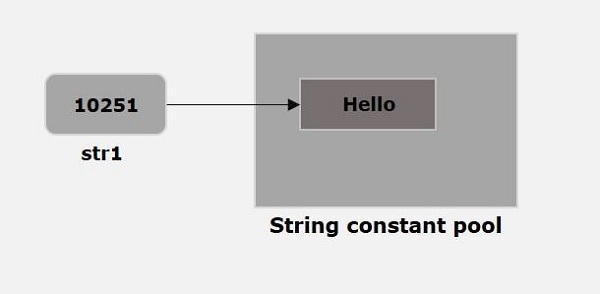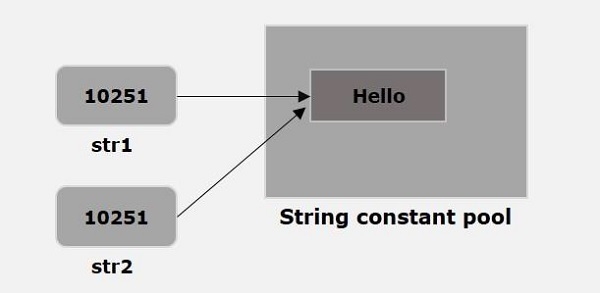
 Data Structure
Data Structure Networking
Networking RDBMS
RDBMS Operating System
Operating System Java
Java MS Excel
MS Excel iOS
iOS HTML
HTML CSS
CSS Android
Android Python
Python C Programming
C Programming C++
C++ C#
C# MongoDB
MongoDB MySQL
MySQL Javascript
Javascript PHP
PHP
- Selected Reading
- UPSC IAS Exams Notes
- Developer's Best Practices
- Questions and Answers
- Effective Resume Writing
- HR Interview Questions
- Computer Glossary
- Who is Who
How and where does String literals in Java stored in the memory?
Strings are used to store a sequence of characters in Java, they are treated as objects. The String class of the java.lang package represents a String.
You can create a String either by using the new keyword (like any other object) or, by assigning value to the literal (like any other primitive datatype).
Example
public class StringDemo {
public static void main(String args[]) {
String stringObject = new String("Hello how are you");
System.out.println(stringObject);
String stringLiteral = "Welcome to Tutorialspoint";
System.out.println(stringLiteral);
}
}
Output
Hello how are you Welcome to Tutorialspoint
Storage of Strings
Strings are stored on the heap area in a separate memory location known as String Constant pool. String constant pool: It is a separate block of memory where all the String variables are held.
When you store a String as
String str1 = "Hello";
directly, then JVM creates a String object with the given value in a String constant pool.

And whenever we try to create another String as
String str2 = "Hello";
JVM verifies weather any String object with the same value exists in the String constant pool, if so, instead of creating a new object JVM assigns the reference of existing object to the new variable.

And when we store String as
String str = new String("Hello");
using the new keyword, a new object with the given value is created irrespective of the contents of the String constant pool.

